The Netherland Inn
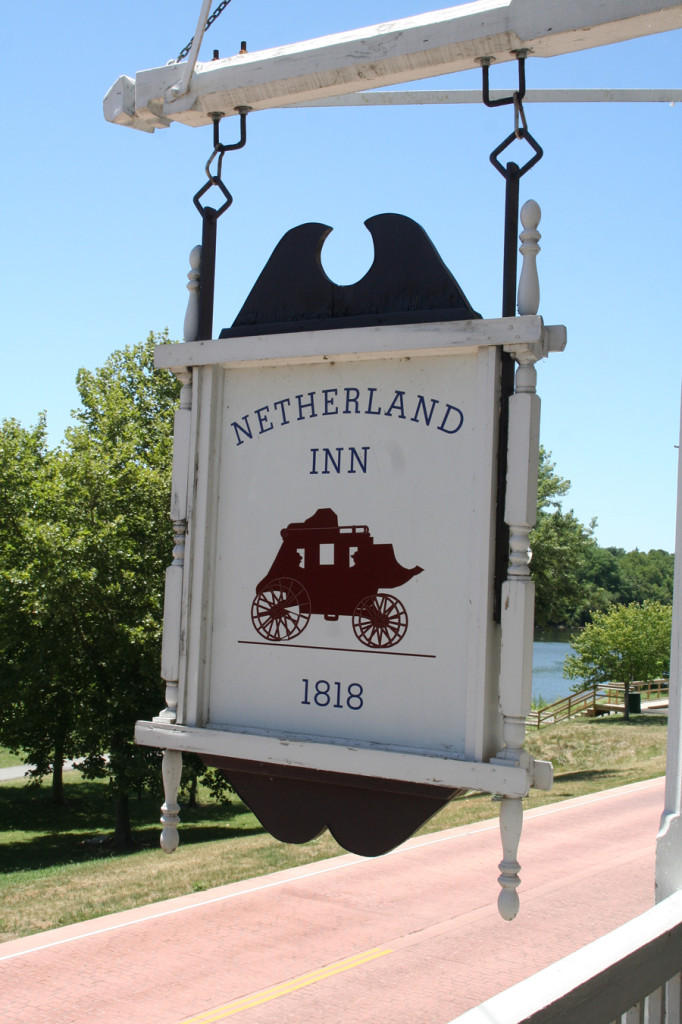 From Wikipedia: The Netherland Inn and Complex is a historic house museum located on the banks of the Holston River in Kingsport, Tennessee, United States. Built in 1802 to serve as a boat yard for salt distribution, the property was eventually sold, and in 1818 it became the Netherland Inn, serving travelers en route from Middle Tennessee to Western Kentucky. The inn and boatyard is the only place on the National Register of Historic Places that served as a stage stop and a boatyard.
From Wikipedia: The Netherland Inn and Complex is a historic house museum located on the banks of the Holston River in Kingsport, Tennessee, United States. Built in 1802 to serve as a boat yard for salt distribution, the property was eventually sold, and in 1818 it became the Netherland Inn, serving travelers en route from Middle Tennessee to Western Kentucky. The inn and boatyard is the only place on the National Register of Historic Places that served as a stage stop and a boatyard.
The building was originally built in 1802, and then expanded in 1808, by William King. King built it with the goal of creating a boatyard to ship the salt he produced. Eventually, the building would be sold in 1818 to Richard Netherland, who build Netherland as it exists today: a three-story building with an inn and a tavern on Great Old Stage Road; the main route between Western Kentucky and Middle Tennessee. Notable people such as Andrew Jackson, Andrew Johnson and James Polk visited the inn.
The inn stayed in the Netherland family until 1906, when it was acquired by H.C. and Nettie Cloud, who used it as a boarding house and their own home. In 1968, it was bought by the Netherland Inn Association, who preserved the building as a historic house museum.The inn and boatyard was placed on the National Register of Historic Places on December 23, 1969, and is the only site that has served as both a boatyard and a stagestop.
Today, the inn is an example of American frontier settlement, using documentation from the journals of Richard Netherland, and related resources, to develop its museum experience. The first floor is a tavern, the second, family quarters, and the third floor are guest rooms; all depicted as they would have been in during the early 19th-century. The majority of the original contents of the inn were destroyed during the War Between the States; however, selected pieces in the museum’s collection are original.
Directly behind the parking lot are three markers remaining from the Old Baptist Cemetery.
Additional information and photos at Tennessee Encyclopedia of History & Culture.
Map link on Google Maps
A marker placed at the Inn by the Junior League of Kingsport reads: “In 1802, William King of Saltville, Virginia, purchased two lots in Christianville, where he built a dwelling, wharfs, warehouses, and a store. In 1818, Richard Netherland, Esquire, purchased the property and established a tavern on the Great Stage Road. The tavern operated as an inn for over 100 years and served Presidents Jackson, Johnson, and Polk. From King’s Boat Yard flatboats laden with salt and other goods were shipped as far south as New Orleans. In 1968 the Netherland Inn Association purchased the property for restoration. It is listed on the National Register of Historical Sites.”
The Bank Barn (below) was built into the embankment and provided a stable on the first level and a second floor for stage coaches and wagon repair. From the early 1800s it remained in use until the 1920s or 1930s. The present building was reconstructed on the original site, and portions of the original limestone foundation are visible.
Also on the site are a reproduction flatboat, a wrought-iron ingot (1790s), the Old Schoolhouse (1790), the Boone Cabin (1773), and the Pence Log House (early 1800s).
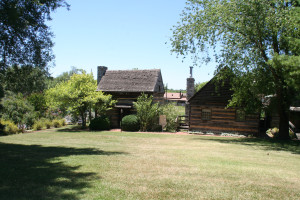 The Old Schoolhouse (left, at right) is described in an on-site plaque as “an Ordinary (inn) – home – schoolhouse, built by 1790.” The description continues: “By 1790, David Ross’ Ordinary at the junction of the Great Stage Road (Bloomingdale Pike) and Reedy Creek Road (W. Sullivan Street); 1795 leased home/inn of sheriff William & Nancy McCormack; 1817, owned by Jacob and Rose Myers; 1854, owners Draper, then Kendrick; 1878 Prof. “Hawk” & Ellen (Groseclose) Copenhaver home & school; 1892 section of well-known merchant Thomas L. Nelms family home; restored at this location 1986; originally a two-story building, only enough logs survived to preserve one story. Its small dependency was moved intact.” Preservationist: H.T. Spoden, P.E. Donors: Bldg. & Funds John & Margaret (Nelms) Wimberly; Major Kingsport City grant; roof funded in honor of Vurl Hammond; chimney stones, originally Rotherwood II front steps, donated by Dr. Lenita Thibault.
The Old Schoolhouse (left, at right) is described in an on-site plaque as “an Ordinary (inn) – home – schoolhouse, built by 1790.” The description continues: “By 1790, David Ross’ Ordinary at the junction of the Great Stage Road (Bloomingdale Pike) and Reedy Creek Road (W. Sullivan Street); 1795 leased home/inn of sheriff William & Nancy McCormack; 1817, owned by Jacob and Rose Myers; 1854, owners Draper, then Kendrick; 1878 Prof. “Hawk” & Ellen (Groseclose) Copenhaver home & school; 1892 section of well-known merchant Thomas L. Nelms family home; restored at this location 1986; originally a two-story building, only enough logs survived to preserve one story. Its small dependency was moved intact.” Preservationist: H.T. Spoden, P.E. Donors: Bldg. & Funds John & Margaret (Nelms) Wimberly; Major Kingsport City grant; roof funded in honor of Vurl Hammond; chimney stones, originally Rotherwood II front steps, donated by Dr. Lenita Thibault.
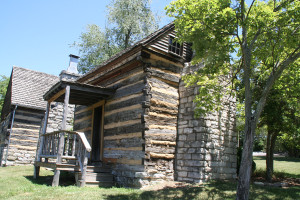 The Boone cabin (right) also serves as a children’s museum. “In 1979/80, this cabin was carefully dismantled and moved from beside the Kentucky wilderness road in Duffield, VA and reassembled here on the foundation site of the Netherland slave cabin, home of a beloved slave, Jordan Netherland and his wife Jane Lynn. This was the 1773-75 home of Daniel & Rebecca Boone and later the Ephraim Fraley home. It is a fine specimen of the typical early pioneer log architecture of the region.” Donated by Jerry Leggs and preserved as a children’s museum by the Hal Spodens, a memorial to their 5-year-old grandson Jeremy H. Honeycutt (1973-1978.) Entirely restored by volunteers. Preservationist: H.T. Spoden, P.E. MCS
The Boone cabin (right) also serves as a children’s museum. “In 1979/80, this cabin was carefully dismantled and moved from beside the Kentucky wilderness road in Duffield, VA and reassembled here on the foundation site of the Netherland slave cabin, home of a beloved slave, Jordan Netherland and his wife Jane Lynn. This was the 1773-75 home of Daniel & Rebecca Boone and later the Ephraim Fraley home. It is a fine specimen of the typical early pioneer log architecture of the region.” Donated by Jerry Leggs and preserved as a children’s museum by the Hal Spodens, a memorial to their 5-year-old grandson Jeremy H. Honeycutt (1973-1978.) Entirely restored by volunteers. Preservationist: H.T. Spoden, P.E. MCS
However, research indicates that the history of the cabin did not involve the Boone family, and is apparently a mixture of building styles. An article posted on HistoricSullivan goes into great detail of the cabin’s true identity.
A 1.5 ton wrought iron ingot was “made in the 1790s at David Ross’ great iron furnace, located originally about 100 yards from the Ross Ordinary.” Donors: Family of Dr. & Mrs. L.C. Cox. Moved by Tom Gannaway. MCS.
The Pence log cabin was “the early 1800s home of Joab and Mary (Gott) Pence and family, formerly located in Arcadia on Pendleton Grant Edgeman-Pence Plantation. It remained in the Pence family for over 100 years. The home was on Arcadia Road between Reedy Creek Road (Bloomingdale Pike) and Eaton’s (Chestnut) Ridge, a route frequently used by travelers and Civil War troops.” Building donated by Mr. & Mrs. Karl Braun. Project supported by Joe Wimberly. Building carefully dismantled, moved and preserved here in 1995 by donated funds and all-volunteer labor led by volunteer P.T. Nottingham, Jr. MCS.”
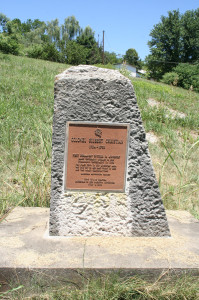 On the west side of Lilac Street across from the Inn is a marker memorializing Colonel Gilbert Christian (1734-1793.) “First permanent settler in Kingsport. Early settlement attempt in 1761; permanent settlement in 1775. The first town in the Kingsport area was laid out on his land grant in 1802 and was named Christianville. American Revolution Patriot.” This marker was placed by the Long Island Chapter, National Society Daughters of the American Revolution, on July 4, 1976.
On the west side of Lilac Street across from the Inn is a marker memorializing Colonel Gilbert Christian (1734-1793.) “First permanent settler in Kingsport. Early settlement attempt in 1761; permanent settlement in 1775. The first town in the Kingsport area was laid out on his land grant in 1802 and was named Christianville. American Revolution Patriot.” This marker was placed by the Long Island Chapter, National Society Daughters of the American Revolution, on July 4, 1976.
Photos by Sharon Steele-Smith, June 2012.

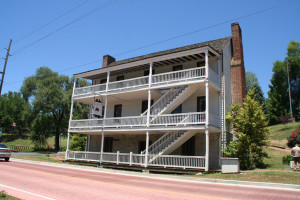
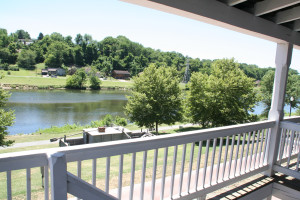
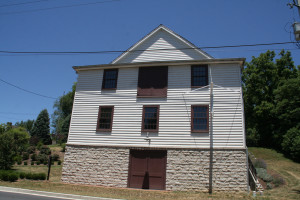
A relative, possibly my g-grandfather John Bowlin drowned in front of the Inn. Do you have records that woud show who it was and why they drowned?
Thank you,
Cissie
I want to know the location of Col. Gilbert Christian’s home, Walnut Hill, which was very close to
The Netherland Inn